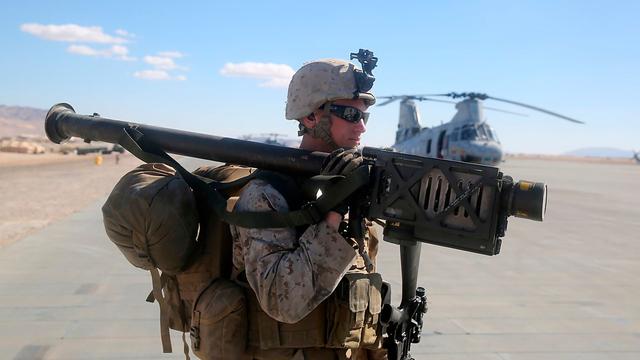Over the past hours, Ukraine has received a number of arms shipments from several allied countries, with signs of war accelerating amid deep concern in Western circles about a Russian invasion of Ukraine at any moment.
Ukraine has received from Lithuania a shipment of US Stinger anti-aircraft missiles, while Estonia will send Javelin anti-armor missiles, and Latvia will also send Stinger anti-aircraft missiles.
The three Baltic states, Estonia, Latvia and Lithuania, had announced earlier that they would provide Ukraine with anti-tank and anti-aircraft missile systems, and equipment necessary to enhance Ukraine's military defense capabilities in the event of a Russian attack.
The Czech Republic also plans to donate to Ukraine 152 mm artillery pieces with 4 thousand 152 mm shells.
Meanwhile, the US embassy in Kyiv announced the arrival of two planes of military aid to Kyiv, as part of US support to strengthen Ukraine's defenses.
The "Stinger" anti-aircraft missiles at low altitude are among the latest American-made anti-aircraft, anti-helicopter and anti-drone missiles.
It is a light, shoulder-mounted surface-to-air missile that has the ability to strike an air target in any part of it.
Earlier, the United States delivered boats to the Ukrainian Navy equipped with "Stinger" missile systems.
Washington had provided the Afghan mujahideen in the last century with this type of missile and they were able to destroy about 270 Russian planes and helicopters with "Stinger" missiles.
Since 2014, Washington has provided more than $2.5 billion in military aid to Ukraine, and has sent 8 new air shipments of $200 million worth of weapons to Kyiv, including Javelin anti-tank missiles, lethal munitions, Humvees and radar systems.
And a bipartisan group of US senators last month promised more supplies, including Stinger anti-aircraft missiles, small arms and boats.
As for Britain, it provided Ukraine with 2,000 NLAW short-range anti-tank missiles, and sent British specialists to provide training, along with Saxon armored vehicles.
Dissemination of information in order to avoid war
The US National Security Adviser said that Washington's disclosure of intelligence about a possible invasion was aimed at avoiding war, not igniting it.

In an interview with CNN, Sullivan stressed the readiness of the United States and its allies to respond unified and decisively in the event of this invasion.
He noted that the world should be prepared to see Russia create a pretext to attack Ukraine.
The United States announced the withdrawal of all American personnel from the mission of the Organization for Security and Cooperation in Europe in Donetsk, where the mission is monitoring the ceasefire between Ukrainian forces and pro-Russian separatists.
Australia and Canada have also begun evacuating their embassies in the Ukrainian capital.
The staff were moved to temporary offices in the city of Lviv, in western Ukraine, on the border with Poland.
Separatists: The situation without Bass is very hot
The leader of the separatists in Donetsk said that Ukraine is mobilizing its forces and moving its equipment, which requires full preparedness on the part of the separatists, and described the situation in Donbass as very hot and that it has reached a boiling point.
Russia also expressed concern over the decision of some countries to withdraw their staff from the OSCE observer mission operating in the Donbass region.
The Russian Foreign Ministry said that Washington is using the OSCE observer mission as a tool of provocation.
The Russian Foreign Ministry considered that the activities of the observer mission are required today more than at any time, in light of what it described as an artificial escalation.
Moscow called on the presidency of the Organization for Security and Cooperation in Europe to take a firm position, to prevent the attempt to exploit the observer mission for provocative purposes, as it put it.
Russian exercises in the Black Sea
In another development, Al-Jazeera correspondent reported that the Russian warships began the active phase of their maneuvers in the Black Sea by pushing their largest warships.
The Kilo submarine, which is considered one of the most dangerous non-nuclear submarines in the world, crossed the Dardanelles Strait to join more than 30 Russian naval units, including destroyers, frigates, minesweepers and landing ships, to carry out large-scale exercises for the Russian Navy.
During the exercises, the ships, warplanes and coastal forces of the Russian fleet will carry out artillery and missile shooting operations at sea, coastal and air targets.
Russian and Belarusian military exercises
In the vicinity of the Belarusian-Ukrainian border, Russian and Belarusian forces conducted joint military exercises in the fields of "Brest" and "Gomel", as part of the ongoing maneuvers between the two countries, titled "Union Resilience".
Al-Jazeera correspondent stated that the exercises, which will continue until the 20th of this month, simulate fighting battles against an attack by an imaginary enemy, in which units of special forces and landing forces participate.
Also participating in the maneuvers - for the first time - are units of the Russian forces of the Eastern Military District.
With the continuing signs of war, military officials say that Ukraine has significantly strengthened its armed forces with the help of its allies, and armed its army in particular with American and British anti-tank weapons and Turkish drones.
The United States and its allies say Russia could invade Ukraine at any moment, and Russia, which has massed more than 100,000 troops near Ukraine's border, denies having plans to do so.
